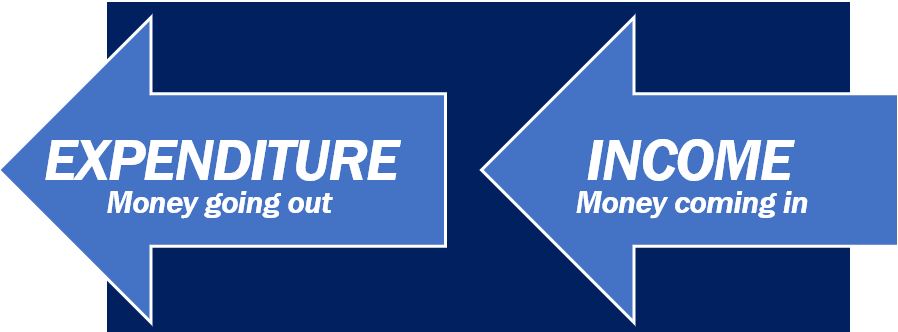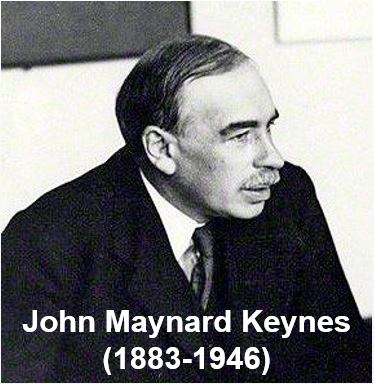What is (an) expenditure? Definition and examples
Expenditure is money spent. It is the action of spending money, as in: “Government expenditure of taxpayers’ money increased significantly last year.”. Anything a person, company, organization, government, or other entity spends on goods, services, or to reduce a debt is expenditure.
 In business, for example, the term refers to the money a company uses to obtain new assets, maintain or improve current ones, or reduce debt, i.e., reduce a liability. Put simply, it means using a resource for business operations.
In business, for example, the term refers to the money a company uses to obtain new assets, maintain or improve current ones, or reduce debt, i.e., reduce a liability. Put simply, it means using a resource for business operations.
My Accounting Course has the following definition of the term:
“These are payments of currency or barter credits for necessary inputs (goods or services). This could be anything from purchases equipment to hiring employees.”
“Obligatory settlements or payment of liabilities such as invoices, receipts, and vouchers can also be considered expenditures.”
We can also use the term when talking about time or effort used, as in: “The expenditure of time and effort on that project was huge.”
Money that businesses and other organizations keep on the premises for expenditure on small or miscellaneous items is called petty cash.
Capital expenditure
When a business buys an asset which has a useful life of at least one year, i.e., a non-current asset, we class that spending as a capital expenditure.
Most money spent to expand a business or purchase a new asset that will boost income over the long term are types of expenditure.
Regarding the acquisition of this type of asset, the Corporate Finance Institute wrote:
“Such an asset, therefore, requires a substantial amount of initial investment and continuous maintenance after that to keep it fully functional.”
“As a result, many companies often finance the project using either debt financing or equity financing.”
Revenue expenditure
When a business spends money or invests in something with a short-term benefit, we class it as a revenue expenditure. In this context, short-term refers to less than 12 months.
In most cases, this type of spending is for financing the company’s day-to-day or ongoing operations. While the spending takes place, we call them operating expenses.
Government expenditure
Government expenditure or government spending includes all the money that a government paid out. Governments finance their expenditure through taxes and borrowing.
-
Fiscal policy
Fiscal policy refers to government expenditure and income. In other words, how much it spends, borrows, and taxes its people and businesses. When GDP growth is sluggish, government spending may rise to kick-start the economy. GDP stands for Gross Domestic Product.
In a previous Market Business News article about fiscal policy, we wrote:
“Through fiscal policy, governments attempt to bring down unemployment and stabilize business cycles. Additionally, in times of recession, they adjust their policy to kick-start the economy.”
Someone who believes that fiscal policy is crucial in economic regulation is a fiscalist.
-
Monetary policy
Monetary policy, on the other hand, includes a central bank’s decisions to manage the money supply to control inflation, and make sure the economy thrives.
Reducing interest rates is a monetary policy decision, while reducing spending on defense is a fiscal policy decision.
-
John Maynard Keynes
 John Maynard Keynes (1883-1946), a British economist, believed that governments could significantly change economic performance by adjusting expenditure and tax rates.
John Maynard Keynes (1883-1946), a British economist, believed that governments could significantly change economic performance by adjusting expenditure and tax rates.
People who believe governments can and should trigger economic growth by spending more, specifically during a recession, are known as followers of Keynesian Economics.
Etymology of expenditure
Etymology is the study of the origin of words, phrases, and expressions, and how their meanings evolved over time.
The term expenditure first appeared in the English language in 1769, with the meaning “act of expending.” It came from the Medieval Latin word “Edpenditus,” the past participle of “Expendere,” which means “to pay out, to weigh out.” In 1791, the term also began to mean “that which is expended.”
Compound phrases with ‘expenditure’
With the term ‘expenditure,’ we can make many compound phrases. A compound phrases is term that consists of two or more words, such as ‘government expenditure’ or ‘capital expenditure.’ Let’s look at five more common compound phrases containing the word expenditure:
-
Healthcare Expenditure
The amount of financial resources spent on health services and products, including medical services, medications, and hospital care.
For example: “The government’s increased healthcare expenditure aims to improve the accessibility and quality of medical facilities.”
-
Operating Expenditure
The ongoing cost for running a product, business, or system.
For example: “Reducing the operating expenditure is crucial for improving the company’s overall profitability.”
-
Personal Expenditure
Expenses incurred for individual needs, including housing, food, and entertainment.
For example: “Her personal expenditure on luxury goods has significantly increased this year.”
-
Public Expenditure
Spending made by the government in providing goods and services to the public.
For example: “Increased public expenditure on healthcare has improved the quality of medical services in the region.”
-
Research Expenditure
Funds allocated for research and development activities in various fields like science, technology, or social sciences.
For example: “The university’s research expenditure has led to groundbreaking discoveries in renewable energy.”
Root word ‘expend’ and parts of speech
The term ‘expenditure’ is a derivative of the root word ‘expend.’ Expend can be modified to create different parts of speech, including nouns, verbs, adjectives, and adverbs:
-
To Expend (verb)
This is the base form, meaning to spend or use up (resources or money).
For example: “They expend a lot of energy on this project.”
-
Expenditure (noun)
Refers to the action of spending money or the amount of money spent.
For example: “The annual expenditure for the project was substantial.”
-
Expendable (adjective)
Describes something that can be used up or spent without much loss or impact.
For example: “The items in the budget considered expendable were cut first.”
-
Expendable (also a noun)
Although primarily an adjective, ‘expendable’ can also function as a noun, especially in military or business contexts, referring to resources or personnel considered not essential and therefore can be sacrificed if necessary.
For example: “In the strategic planning, the expendables were allocated to the high-risk areas of the operation.”
-
Expendability (noun)
This noun refers to the quality of being able to be expended or used up. It emphasizes the idea that something can be sacrificed or consumed without significant loss.
For example: “The expendability of certain supplies was factored into the project’s budget.”
- Adverb
There isn’t a direct adverb form of ‘expend.’ However, you can describe the manner of expenditure using adverbs related to spending, like ‘lavishly or ‘frugally.’
Video – What is Spending?
This video presentation, from our sister channel on YouTube – Marketing Business Network, explains what the meaning of ‘Spending’ is using simple and easy-to-understand language and examples.

